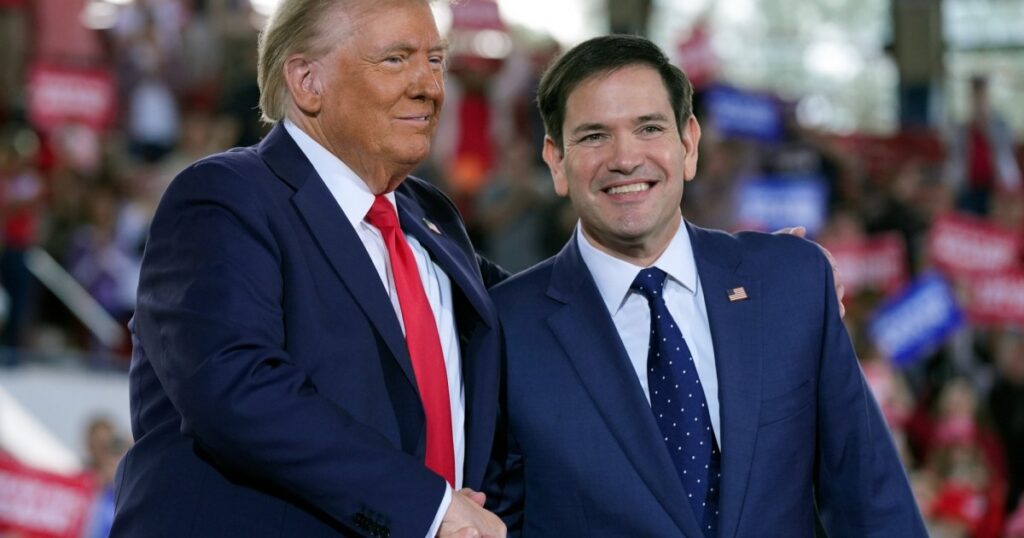Donald Trump greets Marco Rubio during a campaign rally in North Carolina on Nov. 4, 2024. Evan Vucci/AP
A few weeks ago, Vice President-elect JD Vance dubbed Donald Trump “the candidate of peace” during a blitz of Sunday morning show appearances.
Vance was talking about a guy who during his last term reportedly expressed interest in firing missiles into Mexico, and mused about nuking both North Korea and hurricanes.
And, less than a week after Trump’s election victory, the notion of the president-elect as anti-war, a common theme for Vance, has been badly undermined by Trump’s selection of a series of national security hawks—people who advocate using military force to solve international problems—for key administration jobs.
On the campaign trail, Trump found some success in positioning himself in an anti-war lane. He pledged to immediately impose a peace deal for Ukraine and pushed (extremely vaguely) for an end to the war in Gaza. He also bragged, incorrectly, that there were no wars during his administration. (Trump was helped by Vice President Kamala Harris’ reluctance to distance herself from President Joe Biden’s establishment-oriented foreign policy.)
“If these appointments are as advertised, it looks like an appeal to the unreconstructed Liz Cheney caucus.”
Since Trump’s election, there has been a scramble among supporters close to him to nudge the president-elect toward policies and appointments that reject the neoconservative bent of many Republicans. Tucker Carlson and Donald Trump Jr. reportedly were among insiders pushing the president-elect not to select for a job former Secretary of State Mike Pompeo, who has aggressive views on Ukraine, China, and Iran. Trump gave those backers some hope with his announcement last week that he would “not be inviting” Pompeo or former UN Ambassador Nikki Haley “to join the Trump Administration.”
But those small wins are being overshadowed as Trump names a series of hawkish figures to key posts.
Earlier this week, Trump decided to nominate Sen. Marco Rubio, (R-Fla.) as Secretary of State, according to the New York Times, and to name Rep. Mike Waltz (R-Fla.) as his national security adviser. (Sources said that Trump-world figures still hope to stop Rubio, whose selection Trump has not announced, from actually receiving the Secretary of State nomination.)
This news was followed by Trump’s announcement that he would make Rep. Elise Stefanik (R-N.Y.) United Nations Ambassador and former Arkansas Governor Mike Huckabee US ambassador to Israel. On Wednesday, Trump said he would appoint Steven Witkoff, a real estate investor and campaign donor who is also a reliable Netanyahu booster, to be Special Envoy to the Middle East. And he picked John Ratcliffe—a loyalist who in 2020 used his job as Trump’s director of national intelligence to selectively declassify information aimed at bolstering Trump’s false claims about the origins of the Russia scandal—as director of the Central Intelligence Agency.
Trump is “trying to appeal to at least two sides of the party that are diametrically opposed,” said Justin Logan, director of defense and foreign policy studies at the Cato Institute, which has advocated for reducing defense spending and US commitments overseas. “If these appointments are as advertised, it looks like an appeal to the unreconstructed Liz Cheney caucus. It’s an open question whether that is offset by any more than JD Vance.”
Though Cheney supported Harris this year, she and her father, former Vice President Dick Cheney, are identified with the GOP’s long-dominant nonconservative approach to national security policy.
Trump may not have figures like Pompeo and Haley and former national security adviser John Bolton in the White House this time, but “many of the people he has named represent the same views,” said Triti Parsi, the executive vice president of the Quincy Institute.
While both Rubio and Waltz have followed Trump’s lead by expressing skepticism about NATO and the level of US support for Ukraine, they are known as foreign policy hawks. Stefanik, who has espoused similar views, is who is likely to follow Haley’s example of using the UN job as a stage to performatively support the policies Israeli Prime Minister Benjamin Netanyahu and Israel’s far-right government.
Former Democratic Rep. Tulsi Gabbard, a Trump-backer who is herself hoping to win a national security job in the incoming administration, in July urged Trump to avoid Rubio, who she said “represents the neo-con, war mongering establishment.”
Huckabee has been an aggressive advocate of Netanyahu’s expansion of Israeli settlements in the West Bank, even adopting the talking points of Israel’s openly racist far-right, which rejects the idea that Palestinians have any right to live in the West Bank. “There is no such thing as a West Bank,” Huckbee said during a 2017 visit to Israel. “It’s Judea and Samaria. There’s no such thing as an occupation.”
Trump has faulted Biden for the president’s limited efforts to dissuade Netanyahu from continuing his war in Gaza and in Lebanon. Along with that suggestion of carte blanche, Trump’s appointments look likely to further enable Israeli war-making, critics said.
Trump “is naming people based on their loyalty rather than their ideology,” Parsi told Mother Jones. “This doesn’t look particularly encouraging from a foreign policy standpoint, at least when it comes Middle East.”
Despite Trump’s appointments so far, people hoping the president-elect fills the role that Vance imagined are still working to push him away from war advocates.
“The hour is still young,” Logan said. “I am cautiously not pessimistic.”

